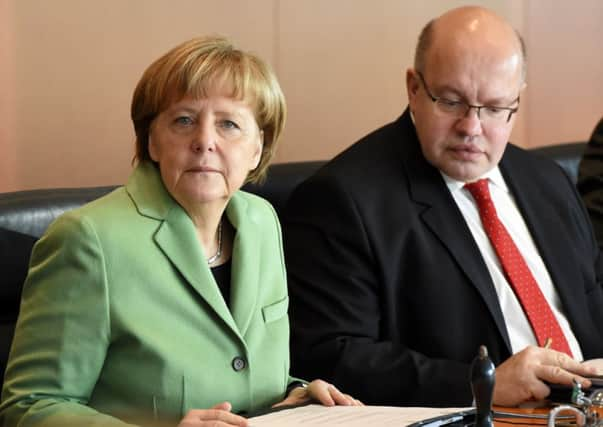Greeks show no sign of flagging in bailout bid


Merkel’s uncompromising stance is likely to put European institutions and other lenders at loggerheads with the Greek leadership, which has vowed to honour pre-election pledges to cut the debt in half.
But she stressed she would like to keep Greece in the Eurozone.
Advertisement
Hide AdAdvertisement
Hide AdThe Syriza party has said it will scrap painful budget measures demanded by Greece’s creditors in exchange for the loans, cancel several planned privatisation projects and considerably scale down planned budget surpluses, required to reduce the debt.
Without the bailout, which started in 2010, Greece would struggle to service its debts and avoid bankruptcy.
Greece, as a Eurozone member, owes some £145bn to the European Commission, £24bn to the International Monetary Fund and £14bn to the European Central Bank – together known as the “troika”.
But Merkel told Berliner Morgenpost: “The aim of our policy was and is that Greece remains permanently part of the euro community.
“Europe will continue to show its solidarity with Greece, as with other countries hard hit by the crisis, if these countries carry out reforms and cost-saving measures.”
She fended off a question about the Greek government’s moves to reverse reforms and re-hire suspended workers.
She said: “We – Germany and the other European partners – will now wait and see what concept the new Greek government comes to us with.”
She was clear, however, about prospects of a debt cut.
Merkel said. “I don’t see a further debt haircut.”
She added: “There has already been voluntary debt forgiveness by private creditors, banks have already slashed billions from Greece’s debt.”
Advertisement
Hide AdAdvertisement
Hide AdAmid demands from some Greeks that Germany pay more compensation for Nazi Second World War crimes, Merkel said: “This question doesn’t arise.”
Greece’s new finance minister Yanis Varoufakis – appointed after Syriza swept to power last Sunday – described the “troika” as a “rotten committee” and refused to work with it to renegotiate the bailout.
He has said he will instead discuss it with the organisations involved individually and EU member states. A planned meeting with French finance minister Michel Sapin was brought forward to yesterday.
Greek prime minister Alexis Tsipras will visit Cyprus tomorrow, Italy on Tuesday and France on Wednesday, but no plans to visit Germany have been announced. His party’s success has emboldened Podemos activists to call for an end to austerity in Spain, with a Madrid rally yesterday.
Varoufakis said: “We are not prepared to carry on pretending and extending, trying to enforce an unenforceable programme which for five years now has steadfastly refused to produce any tangible benefits.
“The disease that we’re facing in Greece at the moment is that a problem of insolvency for five years has been dealt with as a problem of liquidity.”
Greece’s current loans programme runs out at the end of this month and a final bailout payment of £5bn has still to be negotiated. The country was given a two-month extension for completion of negotiations with the troika.
Greece’s parliamentary budget office, which makes quarterly recommendations, warned that the country faces default unless a deal with creditors is reached soon.
Advertisement
Hide AdAdvertisement
Hide AdEU economic and financial affairs commissioner Pierre Moscovici said: “We believe the place of Greece is in the Eurozone, the euro needs Greece and Greece needs and wants to be in the Eurozone.
“We feel it’s very important for the stability of the Eurozone and the credibility of the euro that there is no ‘Grexit’. This is why we will do everything needed to avoid it.”
A further warning has come from German finance minister Wolfgang Schaeuble, who raised alarm at Greece’s negotiation tactics for writing off debt. He said: “There’s no arguing with us about this, and what’s more, we are difficult to blackmail.
“We are prepared to offer all co-operation and solidarity,” he said, but only if Greece abides by its agreements.
Jeroen Dijsselbloem, who chairs Eurozone finance ministers’ meetings has rejected Greece’s request for a debt restructuring conference.
Shares on the Athens stock exchange closed down 1.6 per cent Friday, with losses of 13 per cent for the week. The interest rate on three-year bonds – a gauge of the short-term risk of default – rocketed to 19.3 per cent.
Total Greek debt: £242bn
Bailout: £179bn
Creditors include:
Eurozone £145bn
International Monetary Fund £24bn
European Central Bank £14bn
Greek banks £7bn
Greek average wage:
£450 a month (£2,200 in UK)
Unemployment:
25% (6% in UK)
Youth unemployment:
50%approx
(17% in UK)
FOLLOW US
SCOTSMAN TABLET AND MOBILE APPS